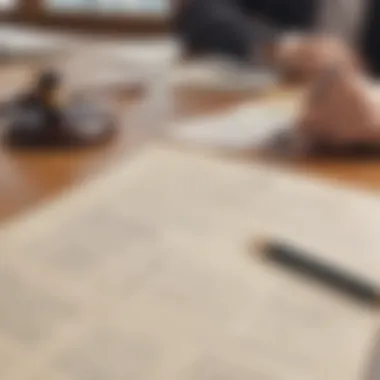Understanding the Probate Process and Its Implications


Intro
Probate is a term that often makes folks uneasy. It brings to mind lengthy court processes, family disputes, and financial headaches. But what exactly does it mean? This article aims to dissect the probate process, highlighting its importance and implications for estate administration. Understanding this topic is crucial for a wide array of individuals – from those drafting their wills to investors involved in estate planning.
In simplest terms, probate is the legal process through which a deceased person’s assets are managed and distributed. This often involves validating their will (if one exists), determining what assets are subject to probate, and ultimately facilitating the transfer of those assets to heirs or beneficiaries. But it doesn’t end there. The process can also reveal alternatives that may exist, allowing for smoother transitions in estate management.
As we wade through the intricate layers of probate, we will delve into key financial terms and practical aspects that investors, financial advisors, and estate managers must understand. Knowing the kinds of property that require probate, as well as recognizing possible bypass strategies, is paramount for effective estate planning. After all, being informed is half the battle. Let’s dive deeper into the complexities of probate – it’s a crucial step in ensuring that loved ones are taken care of, even after we’re no longer around.
Foreword to Probate
The probate process serves as a crucial framework in managing the distribution of a deceased person's estate. It's not just a legal formality but holds significant implications for the heirs, beneficiaries, and the overall management of assets. Understanding probate is essential, particularly for investors, financial advisors, analysts, brokers, and educators who navigate various facets of estate management.
Definition of Probate
Probate refers to the legal process that takes place after someone passes away. This process involves validating the deceased's will (if available) and overseeing the distribution of their assets. Essentially, it acts as a method to ensure that the deceased's final wishes are carried out and that debts and taxes are settled before any inheritance is distributed.
The mechanism of probate surfaces in almost every estate scenario, creating a point of transition where assets are moved from the deceased's ownership to their heirs. Without this process, the transfer of assets could become fraught with complications, misunderstandings, or just plain chaos.
Purpose of the Probate Process
At first glance, the probate process might seem cumbersome. However, it serves several notable purposes:
- Validation of the Will: This is the cornerstone function of probate. The court verifies the authenticity of the will, ensuring that it's a legitimate document made by the deceased.
- Debt Settlement: One important duty of the probate process is to clear any outstanding debts the deceased might have left behind. This ensures creditors are paid before assets are handed over to heirs.
- Asset Distribution: Through the probate process, the proper channels for distributing the deceased's assets are established. It assists in adhering to the terms laid out in the will or, if no will exists, following state laws about intestate succession.
- Providing Clarity: By placing the estate's management under court supervision, the probate process can mitigate potential disputes among heirs. It provides a clear path for how the estate will be handled.
What Goes to Probate?
Understanding what goes to probate is crucial for grasping the overall probate process. It helps in making informed decisions—whether you're planning your estate or dealing with a loved one’s affairs. Knowing which assets are subject to probate can significantly impact how quickly and smoothly the process goes. Moreover, understanding these facets allows individuals to better prepare their documentation and strategies to navigate the complexities involved. This section discusses those assets and explores exceptions which might not require probate, making the topic not only relevant but essential for estate planning.
Types of Assets Subject to Probate
Real Estate
Real estate plays a pivotal role in probate because it is often one of the largest assets within an estate. When someone passes away, if their property isn't placed in a trust or has a designated beneficiary, it usually enters probate. A key characteristic of real estate is its intrinsic value—typically, it holds both sentimental and financial significance.
However, it comes with its own set of advantages and disadvantages. For instance, real estate can be a beneficial choice because it cannot be simply liquidated without following judicial protocols. This process allows for fair valuation, but on the flip side, it can also lead to delays in distribution, as properties may need to go through a lengthy appraisal process. Additionally, managing real estate requires knowledge about local laws and potential upkeep costs, complicating matters further during probate.
Bank Accounts
Bank accounts are another significant asset subject to probate. This includes checking, savings, and certain types of investment accounts. The defining trait of bank accounts is their liquidity; they can be converted to cash very easily, which can be a double-edged sword during the probate process.
Why choose bank accounts? They are often a straightforward type of asset to handle in terms of transferring ownership, especially if they do not have a named beneficiary. Still, one must remember that once account owners are deceased, accessing funds usually requires navigating through the probate court, which can delay financial access for the heirs. The upside to potentially having a simpler resolution can also present challenges, particularly in proving the estate's claims against the accounts.
Personal Property
Personal property, which may include anything from jewelry to vehicles, also enters the probate fray. This category is noteworthy because it encompasses a wide range of items, from cherished heirlooms to valuable collectibles. What’s interesting about personal property is its vagueness in valuation; unlike real estate, which generally holds clearer market values, personal property can fluctuate unpredictably in worth.
While it is often considered a popular asset group for various estate plans, it is subject to scrutiny and, at times, disputes among heirs. The unique feature of personal property lies in its emotional ties; yet, this could lead to even more complex probate issues. There can be challenges in verifying ownership and ascertaining fair division, complicating the workflow.
Exceptions to Probate Requirements
Not all assets are subject to probate, which can significantly simplify the estimated time and expenses related to death and estate administration. Understanding these exceptions helps manage expectations better.
Assets with Named Beneficiaries
Assets with named beneficiaries bypass the probate process altogether. This includes life insurance policies, retirement accounts, and often certain bank accounts. The allure of these assets is clear: they can provide immediate financial benefits to named individuals without the hassle of probate. The key characteristic is the speed of transfer, which is beneficial during emotionally taxing times. Yet, it’s essential to keep the beneficiary designations up to date, as outdated beneficiaries can lead to unforeseen consequences.


Jointly Owned Property
Jointly owned property, including real estate or bank accounts held jointly, offers another route out of probate. The defining feature here is the right of survivorship, which means that when one owner dies, the other automatically takes ownership. Many find this form of ownership appealing as it simplifies transfers—no courts involved. However, complications arise if disputes come about regarding joint ownership during probate proceedings, particularly if the deceased had other kids or heirs who claim rights to the property.
Understanding which assets enter probate—and why—can make a world of difference. Knowing these details provides a comprehensive view of what to expect, helping both heirs and asset holders. Developing a thoughtful estate plan that incorporates this knowledge can lead to fewer complications and more straightforward resolutions.
The Role of a Will in Probate
A will serves as a cornerstone in the probate process, providing clarity and direction during what can be a tumultuous time for the deceased's loved ones. The importance of having a well-drafted will cannot be overstated; it lays out the decedent's wishes, guiding the probate court and the executor in making critical decisions regarding the distribution of assets. Without one, relatives may find themselves embroiled in disputes, facing delays, and even to potential financial strain while navigating a less certain path.
Understanding Last Wills and Testaments
A last will and testament is essentially a legal document that outlines how a person's assets and affairs will be handled after they pass away. One might think of it as a road map for the deceased’s estate. It detailes who gets what and can include everything from real estate to sentimental jewelry. Typically, a valid will also appoints an executor, the individual given the duty to carry out the provisions of the will.
It's important to recognize that the will needs to be executed in accordance with the state laws, meaning it should be signed and witnessed appropriately. Failing to consider these formalities can have dire consequences, rendering the document invalid. This situation, while potentially avoidable, is more common than one might assume, often leading to friction among heirs and relatives.
"A will is not just a piece of paper; it’s a binding agreement that ensures your wishes are respected."
Things can take a nasty turn where disputes erupt among heirs. The clarity provided by a well-structured will takes front stage here. Clarity can ease the burdensome atmosphere— at worst, it helps to keep bickering cousins out of court.
Validity of a Will in Probate Proceedings
In probate proceedings, the will’s validity is paramount. A will must generally meet specific legal criteria to be considered valid. Factors include the testator’s age, mental capacity, and whether the will was created voluntarily. Even simple mistakes could complicate the process later. If the will lacks a signature or wasn’t witnessed correctly, the court might not honor it, sending the estate into intestacy laws, where the assets are distributed according to state statutes rather than the deceased’s wishes.
Moreover, the presence of a self-proving affidavit can enhance the chances of a smoother probate process. This document allows the court to accept the will without requiring witnesses to testify, further simplifying things. It’s a small step that can save loads of time and potentially costly complications during probate.
To ensure that wills endure the scrutiny of the probate process, it’s wise to consult with a legal expert well-versed in estate planning. They can shed light on how to ensure that the last will will stand the test of time — and legal challenges.
Ultimately, understanding the role of a will in probate is crucial for anyone looking to safeguard their legacy. Whether it’s crafting a will that aligns with state laws or understanding how it operates in the probate proceedings, adequate knowledge can be a game-changer in ensuring your wishes are honored.
The Probate Process Explained
The probate process stands as a crucial juncture in the journey of managing an estate after the passing of an individual. This procedure is not merely a formality; it’s a systematic approach that ensures a deceased person's assets are upkept and appropriated accordingly. Understanding its significance helps in making well-informed decisions that can safeguard the interests of both the heirs and the estate.
The probate process involves several steps, each contributing to the effective resolution of estate matters. Engaging with it properly means not only ensuring validity and legality but also minimizing conflicts among heirs and related parties.
The probate process provides a framework for distributing the deceased's assets while addressing debts, and it serves as a public record establishing rights and responsibilities.
Filing for Probate
Filing for probate is the initial step within this intricate process. This action starts when an executor—often designated in the will—files a petition with the probate court. Most times, this petition is filed in the county where the deceased resided, but nuances may arise depending on local laws.
The filing contains essential details, such as:
- The name of the deceased person
- Date of death
- A list of the beneficiaries
- Any property owned by the deceased
It’s vital to remember that different jurisdictions may require specific forms or information. Engaging a probate attorney during this phase can prove invaluable. They assist in ensuring that everything is in order, minimizing delays, and establishing clear communication with the court.
Inventorying and Appraising Assets
Once the estate is in the probate system, the next step is to conduct a comprehensive inventory of the assets. This phase is crucial because it provides a detailed perspective on what the estate holds. The executor is generally responsible for compiling this list, which should include:
- Real estate: Homes, rental properties, and any other real property
- Financial accounts: Bank statements, retirement funds, and investment accounts
- Personal belongings: Vehicles, jewelry, art collections, and valuable items
Each of these assets needs to be appraised to determine their current market value. Accurate appraisals are essential not just for distribution purposes but also for addressing any estate tax obligations that may arise. Depending on the complexity and scale of the estate, hiring professional appraisers might be prudent, as they can provide a more precise valuation.
Settling Debts and Claims


After establishing the inventory and valuations, the next order of business involves addressing any outstanding debts or claims against the estate. This aspect is paramount because it directly affects the net value that will be distributed among the beneficiaries.
To settle debts, the executor must:
- Identify all outstanding debts, including loans and credit obligations.
- Notify creditors and give them a set timeframe to make claims.
- Prioritize debts based on statutory requirements, often paying off secured debts first.
Settling debts ensures the estate is distributed equitably and legally. Failing to address claims can lead to complications that may burden the heirs or even result in legal disputes. Therefore, maintaining diligent records and ensuring proper communications with creditors during this phase is paramount.
Challenges in the Probate Process
Navigating the probate process can be akin to walking through a minefield. Not only does it deal with the emotional aftermath of losing a loved one, but it also involves numerous potential pitfalls that can complicate the administration of an estate. Understanding these challenges is crucial for anyone who finds themselves involved in probate, whether they are heirs, executors, or professionals guiding clients through the process.
Disputes Among Heirs
One of the most significant issues encountered during probate is disputes among heirs. When a loved one passes away, differing opinions among beneficiaries can lead to heated confrontations. It’s not unusual for emotions to run high, and what sometimes may appear as simple disagreements can escalate into full-blown legal battles. These disputes often arise from:
- Ambiguities in the Will: If the will is vague or contradictory, it can leave room for interpretation, causing confusion and potential conflict.
- Perceived Inequities: Heirs may feel they deserve more, fostering jealousy or resentment, especially if they believe they had a closer relationship with the decedent.
- Communication Breakdowns: Often, families fail to communicate effectively about the estate, which can breed mistrust and suspicion.
Disputes can prolong the probate process significantly, resulting in additional legal expenses and emotional distress. Thus, it's essential to approach these issues with clear communication and, when necessary, the guidance of a probate attorney to mediate conflicts and protect the estate's interests.
"The most profound relationship we can have with anyone is the one we have with ourselves. When we don't take care of our feelings, conflicts with others can arise."
Fraudulent Claims and Mismanagement
Trickery can sometimes rear its ugly head during the probate process, manifesting in fraudulent claims and potential mismanagement of the estate. Executors and administrators have a fiduciary duty to act in the best interests of the estate, but not everyone comes with good intentions. Common concerns include:
- Fraudulent Claims: Unscrupulous individuals might emerge, claiming liabilities that do not exist or unscrupulously seeking part of the estate through deceitful means. This can lead to legitimate beneficiaries receiving less than they deserve.
- Mismanagement of Estate Assets: Executors may lack the necessary expertise to manage estate assets effectively, which can lead to losses. Poor decisions regarding selling or maintaining property could jeopardize the estate's value.
- Lack of Transparency: When beneficiaries are kept in the dark about financial activities relating to the estate, it can foster suspicion and lead to accusations of mismanagement.
Preventing these challenges often requires thorough documentation, transparency in handling estate affairs, and vigilant oversight. Engaging a knowledgeable probate attorney can help navigate these muddy waters, ensuring that all claims are legitimate and that the estate is managed prudently.
Probate Alternatives
Navigating the probate process can often feel like trudging through a mud puddle on a rainy day. It’s not only time-consuming but can also become a costly affair, sometimes stretching over months or even years. This is where the significance of exploring alternatives to probate becomes evident. These alternatives might simplify the transition of assets while reducing legal fees and ensuring a more seamless distribution to heirs. By considering various strategies, individuals can protect their estates from the complexities tied to probate.
Living Trusts
Living trusts emerge as a popular alternative for many contemplating estate planning. Unlike a will, a living trust remains effective while the individual is alive, allowing them to maintain control over their assets. Here’s how it works:
- Creation: A living trust is established by the grantor, who transfers title of their assets into the trust. This can include real estate, bank accounts, and investments.
- Management: The grantor can also serve as the trustee, managing the trust during their lifetime. This gives them flexibility, ensuring that they can adapt to changing personal circumstances or market conditions.
- Posthumous Benefits: Upon the individual’s passing, the successor trustee can take over without the need for probate. This can prevent the court proceedings that might otherwise cause delays and added burdens for heirs.
Consider the following benefits of a living trust:
- Avoidance of probate fees and potential delays.
- Privacy, as trust assets don’t go through public probate proceedings.
- Immediate access to assets for beneficiaries, reducing the time before they can utilize inherited property.
Ultimately, individuals must weigh the initial costs and complexity of setting up a living trust against its long-term benefits.
Small Estate Procedures
For smaller estates, some states offer simplified probate procedures designed for individuals with limited assets. These small estate procedures can be a breath of fresh air for families who find themselves overwhelmed by the typical probate process. Here’s a general idea of how these procedures function:
- Eligibility: Each state has its own threshold for what constitutes a small estate, generally ranging from $50,000 to $200,000 in value, not including real estate.
- Procedure: If the estate meets the criteria, beneficiaries can typically file a simplified form, which might allow the direct transfer of assets without formal probate proceedings. This can often be handled without an attorney, saving money in legal fees.
- Quick Resolution: The process can be much quicker than traditional probate, allowing heirs to receive their inheritances swiftly and with less hassle.
In summary, alternatives like living trusts and small estate procedures can offer effective means of sidestepping the often cumbersome probate process. Taking time to understand each option can greatly benefit individuals looking to manage their estates more efficiently, leading to a smoother experience for those left behind.
In essence, planning ahead and considering alternatives can ease the transition of assets, mitigating stress for beneficiaries and preserving the estate's value.
Legal Considerations in Probate


When delving into the intricate landscape of probate, legal considerations are paramount. These nuances can greatly affect how an estate is processed, assets distributed, and disputes resolved. Understanding these legal elements is not merely an academic exercise; it's essential for stakeholders seeking to ensure a smooth execution of the deceased’s wishes. By grasping the particulars, one can sidestep potential headaches down the line.
Role of a Probate Attorney
Hiring a probate attorney can save a lot of time and trouble. These legal professionals specialize in navigating the complexities of estate law. They offer guidance on various aspects of the probate process, including filing necessary documents, understanding statutory obligations, and representing the estate in court if disputes arise.
A probate attorney typically advises personal representatives (executors) on how to formulate a strategy for settling the estate and ensuring legitimate debt claims are processed accurately. This could encompass interpreting the will or, if there are complexities, even helping decipher conflicting legal terminology.
Moreover, if family members are squabbling over assets, a probate attorney can be a pivotal ally. They know how to mediate disputes effectively, keeping everyone on track without letting emotions cloud judgment. This expertise becomes invaluable especially when disagreements seem inevitable. The cost of hiring these attorneys can be offset by the peace of mind they bring, helping to avert costly mistakes that might arise from missteps in the filing process.
Court Requirements and Filings
Understanding court requirements is like having the key to a locked door during probate. Each jurisdiction has specific forms, deadlines, and protocols that must be adhered to. Failing to satisfy these requirements could lead to delays or even outright dismissal of the probate case.
To initiate probate, executors usually must file several critical documents, including:
- The Death Certificate: Proof of death must be presented before any other actions can be taken.
- The Will: If available, this document is submitted to verify the deceased’s wishes officially.
- Petition for Probate: This formal request to the court initiates the probate process, laying out the basis for the court's involvement.
The probate court will also require periodic updates. For instance, an inventory of the estate’s assets is often needed shortly after the probate begins, along with reports on how debts are being settled. Missing these deadlines can put executors in hot water, not to mention impacting how and when beneficiaries receive their inheritance.
Moreover, once the probate process is initiated, the court then assumes oversight. This means all actions taken by the executor must be documented and often reported back to the court, ensuring transparency throughout the proceedings. This oversight helps protect beneficiaries but can also create layers of bureaucracy that delay the process.
"Navigating the probate process requires a keen understanding of legal obligations, and where there’s uncertainty, it’s wise to consult professionals who know the ropes well."
In summary, the legal landscape of the probate process is complex and layered. With a solid grasp of the role that probate attorneys play and the specific court filings required, stakeholders can better navigate the often-challenging terrain. Approaching probate with a clear understanding can help reduce stress and facilitate a smoother path toward resolution.
Tax Implications of Probate
Understanding the tax implications of probate is essential for anyone involved in estate administration. The probate process does not just deal with the distribution of assets; it also comes with a series of tax responsibilities that can impact both the estate and the beneficiaries. Ignoring these factors can lead to unexpected financial burdens down the line, making it critical to approach this part of the process informed and prepared.
Estate Taxes Explained
When a person passes away, the estate may be subject to estate taxes. These taxes are based on the overall value of all assets included in the estate, such as real estate, investments, and personal property. The rules surrounding estate taxes can vary widely from one jurisdiction to another.
In the United States, the federal estate tax only kicks in for estates exceeding a certain threshold—currently set at around $12.92 million as of 2023. For many families, especially those with modest estates, this may not be an immediate concern. However, state estate taxes may apply at lower thresholds, and they can differ significantly from state to state.
The key steps concerning estate taxes include:
- Valuation of the Estate: Accurately determining the value of each asset is fundamentally important. Under- or over-valuing assets can lead to complications with tax filings.
- Filing Estate Tax Returns: Typically, a Form 706 is necessary to report estate taxes to the IRS. Familiarizing oneself with the requisite documentation is crucial.
- Payment of Taxes: It’s essential to know how and when to pay these taxes to avoid penalties and interests.
It's wise to consult with a tax advisor with expertise in the probate process. They can provide tailored advice based on the specifics of the estate at hand, helping to ensure compliance and possibly minimizing tax obligations.
Tax Returns and Regulations
Navigating tax returns and regulations during probate requires attention to detail and a clear understanding of the legal landscape. The estate may be required to file income tax returns if it generates income after the person has passed. This means that, even in the midst of settling estate and probate matters, fiduciaries must remain cognizant of ongoing tax obligations.
Some vital considerations for tax returns include:
- Personal Income Tax Returns: If the deceased earned income prior to death, a personal tax return may need to be filed for that year.
- Earning Income from Estate Assets: Sometimes, assets owned by the estate continue to generate income, whether through rental properties or investments. In such cases, the estate itself may need to file returns.
- Timeliness of Filings: Meeting deadlines for tax filings is crucial. Failure to do so can result in penalties or complications down the road.
- Establishing an EIN: The estate needs an Employer Identification Number (EIN) from the IRS for tax purposes, serving as the identifier for the estate's income tax filing.
For those involved in handling these financial aspects, understanding tax laws is an invaluable asset. Legislation can change, and local nuances may exist, necessitating professional guidance. In summary, grasping the tax implications during probate is not just about compliance; it’s about safeguarding an estate’s value for intended heirs.
Closure: Navigating the Complexities of Probate
The probate process can often feel like traversing a maze. It’s essential to grasp its significance, especially when managing the affairs of a deceased loved one. Understanding these complexities not only helps in navigating probate more efficiently but also prepares one for the unexpected twists that can arise along the way.
At its core, the probate process serves to legally validate a deceased person's will, if one exists, and ensure that their wishes are honored. Realizing that your role is not just administrative but also deeply personal can help focus efforts on doing right by the departed. As you reflect on the implications of the probate process, consider the following critical elements:
- Asset Distribution: The main aim of probate is to allocate the deceased’s assets according to their wishes or the law, when no will exists. Understanding how this distribution happens can simplify what might otherwise appear as a convoluted legal procedure.
- Legal Requirements: Each jurisdiction has its own set of laws governing probate. Familiarity with these rules without getting bogged down by specific language is crucial for effective estate management.
- Potential Challenges: Inheritors might face disputes or claims that can delay the process. Being aware of such potential roadblocks beforehand can better equip one to handle any challenges that arise.
- Financial Implications: Probate can carry certain costs, including taxes. These might be less than one expects, but a clear understanding of what these entail can save a lot of headaches later.
- Alternative Solutions: Knowing about alternatives such as living trusts can provide other ways to manage estates, which can be beneficial in certain situations that avoid the lengthy probate process.
"The probate journey can be narrow and winding, but knowledge is a guiding star that leads the way."
By maintaining a proactive approach, staying informed, and perhaps even seeking expert legal advice, navigating the complexities of probate takes on a more manageable form, enriching one’s journey through a challenging yet meaningful process.







